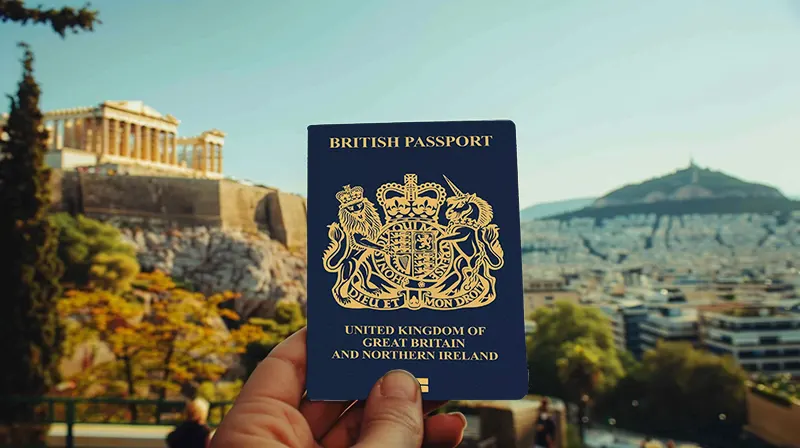Buying Property in Greece as a British Expat

With its sun-drenched islands, ancient ruins, and colourful culture, moving to Greece offers an enticing opportunity for British citizens looking to buy property abroad.
Whether you dream of a home by the Aegean or investing in one of Europe’s fastest-rebounding real estate markets, buying property in Greece has never been more appealing.
The process is relatively straightforward for UK citizens, and various property types are available, from modern apartments in Athens to luxurious villas in Mykonos.
With low property taxes, access to the Golden Visa program, favourable rental yields and capital growth conditions, Greece is rapidly becoming a hotspot for foreign investors.
Before committing to living in Greece, you need to understand what is involved in the buying process.
This guide will explain the critical steps to buying property in Greece to make your exciting new journey as easy as possible.
We also offer tips to help you avoid common pitfalls and highlight some of the top locations where you can maximise your investment in this Mediterranean gem.
Do I need a Visa to Purchase a Property in Greece?

You won’t need a visa to purchase a property in Greece.
No, you do not need a visa to purchase property in Greece.
The Greek government allows non-residents, including those from the UK, to buy real estate without requiring any form of residency permit.
However, purchasing property does not automatically grant you the right to live in Greece in the long term.
If you wish to stay for extended periods, you must apply for a residence permit.
One attractive option for non-EU buyers is Greece’s Golden Visa program, which grants residency to those who invest a minimum of €250,000 in real estate.
This visa allows you to live, work, and travel within Greece and the Schengen Zone.
The permit is renewable every five years, making it an appealing option for those considering long-term stays.
Otherwise, you may need to explore other residency routes, such as employment, retirement permits, or family reunification.
An Easy 8-Step Guide to Buying a Home in Greece

Following these steps will help to make purchasing a property in Greece as easy as possible.
1. Choose the Location
When choosing where to live in Greece it is important that you consider your lifestyle preferences and personal circumstances first.
You may be single without any worries about schools or easily accessible healthcare.
Perhaps you are relocating to Greece with your family.
In this case, you will need to consider education options very carefully.
Many people come to Greece to retire, and being close to a good bus service, train station or healthcare facilities will be a priority.
Research property prices, accessibility, and amenities in each region, and ideally, visit potential areas to get a true sense of what areas best fit your needs.
Location is all important and can make or break a foreign relocation.
Later in our article, we will briefly outline some of the most popular towns and cities that attract ex-pats looking to buy property in Greece.
2. Set Your Budget
Establish a clear budget and seriously consider your expenses, keeping in mind each of these factors:
- What are you going to spend on a home? Research prices in different areas as they vary significantly.
- Factor in additional costs like taxes, legal fees, and property maintenance costs.
- Financing your purchase. Check the availability of mortgages, as they may be harder to secure as a foreigner.
- If you are considering the Golden Visa program, the minimum investment in real estate is €250,000 in most areas, though specific high-demand locations like Athens require €500,000 so keep this in mind when choosing the area you want to live in.
- Currency exchange. Fluctuations in the GBP-EUR exchange rate can impact your budget, so monitor it closely when transferring funds.
Setting a realistic budget with these costs in mind ensures a smooth and well-planned purchase.
3. Get a Tax Identification Number (AFM)

A Tax Identification Number (AFM) is needed for all of your legal and financial transactions.
You must apply for a Greek Tax Identification Number (AFM) to buy property in Greece.
This is required for all legal and financial transactions and is essential when buying a home anywhere in Greece.
Though it is an easy process, it requires some preparation:
- Visit a Local Tax Office: You must apply in person at the nearest Greek tax office (DOY).
- Required Documents: You’ll need to bring your passport, proof of address (like a utility bill), and sometimes evidence of your reason for obtaining the AFM, such as a contract to buy property.
- Language Assistance: It’s a good idea to have a Greek-speaking lawyer or agent assist you, as the process is usually in Greek and their understanding will certainly help.
4. Find a Good Estate Agent

A good estate agent will really help to make the buying process more manageable.
When you are unfamiliar with the Greek property market, a good real estate agent is worth their weight in gold.
In Greece, estate agents must be licensed and registered with the relevant chamber of commerce.
Always check whether the agent you’re considering is properly licensed as this ensures they adhere to professional standards and legal requirements.
Personal recommendations from friends, expats, or online communities can be a great way to find trusted agents.
Platforms like Expat Forum and Internations will have valuable firsthand insights from other foreign buyers, so be sure to check them out.
Communication is essential for a foreign buyer. Choosing an estate agent fluent in English will make the process smoother.
Many Greek agents offer services specifically catered to expats and international buyers.
Websites like Worldwide Lawyers can help connect you with real estate professionals in Greece who are fluent in English, so be sure to check it out.
Several online platforms list properties in Greece and can connect you with trustworthy agents. Popular ones include:
5. Hire a Lawyer

It is important to find a good Greek speaking lawyer to assist with your purchase.
Hiring an English-speaking Greek lawyer to assist with due diligence is highly recommended.
Hiring a reputable property lawyer will work to protect your legal and financial interests and is the best way to safeguard yourself throughout the purchasing process.
Greek property law can be complex, and foreign buyers might face challenges such as language barriers, understanding local regulations, and navigating the legal intricacies of property transactions.
An independent lawyer will perform due diligence, ensuring the property is free from encumbrances such as mortgages or legal claims.
They will verify the seller’s ownership and ensure that all necessary documents, such as property titles and contracts, are legitimate and in order.
Your lawyer will also help guide you through critical steps like obtaining a Greek Tax Registration Number (AFM) and handling negotiations on your behalf.
Hiring an independent lawyer prevents conflicts of interest, as relying on lawyers affiliated with sellers or developers can compromise your position.
For reputable legal services, you can consider contacting firms like Worldwide Lawyers, which connects clients to independent English-speaking lawyers in Greece, or Valmas Associates, which specialises in property transactions for foreign buyers.
6. Sign a Preliminary Contract

A preliminary contract
Once you find your dream property, the seller will ask you to sign a preliminary contract outlining the terms of the sale.
This is not the final contract; it merely secures the buyer’s right to the property.
However, if either party backs out without a valid reason, there can be penalties, such as the buyer forfeiting the deposit or the seller returning it with an additional penalty.
A small deposit, often 10%, is typically required to reserve your property in Greece.
This contract is not always necessary, but it’s common in cases where the sale cannot be finalised immediately.
It offers both parties legal protection during the interim period.
7. Get a Notary

A notary will help finalise the purchase.
In Greece, a notary plays a crucial role in the property-buying process.
The notary is an impartial public official responsible for overseeing and formalising the legal aspects of the transaction.
The notary will draw up the final contract and oversee its signing.
The buyer and seller sign the final contract in the notary’s presence who then authenticates these signatures, which is required for the contract to be legally binding.
After the contract is signed, the notary ensures it is correctly registered with the Land Registry or Cadastre, a process that can take 1-4 weeks, depending on the region you are moving to.
This registration is essential to legally transfer the property ownership and protect the buyer’s rights.
8. Transfer Funds and Pay Taxes
Once the legal checks are complete and the sale is finalised with the signing of the contract, the final part of the deal is to pay for your new home.
Keep in mind that the buyer is responsible for paying a 3% property transfer tax based on the property’s assessed value.
You must also cover the notary’s fee (around 1% of the property price) at this final stage.
How Long Does It Take to Buy a Home in Greece?

It will typically take between 6 weeks to 3 months to buy a property in Greece.
Buying property in Greece as a foreigner typically takes between 6 weeks to 3 months.
However, bear in mind that there are several factors that can affect the timeline; they may include:
- The transaction’s complexity
- The property’s location or region
- Efficiency of the due diligence process.
- Land registry delays
- Financing and Mortgage Approvals
- Additional Documentation for Non-EU Buyers
Following these steps will help you navigate the Greek real estate market effectively, ensuring a smooth and legally compliant purchase in the quickest time possible.
A Word of Caution

There are a few things to keep in mind when purchasing a home in Greece.
Purchasing property in Greece can be a rewarding investment but also involves navigating legal complexities and potential risks.
As a foreign buyer, you must be aware of some of the common pitfalls and take steps to protect yourself against them.
One of the most common risks when buying property in Greece is falling victim to scams.
Fraudsters often target foreign buyers unfamiliar with the local market and regulations.
So how can you avoid this?
It is important that you never transfer money without verifying the property and the seller.
You should always arrange to visit the property in person or via a trusted representative before committing financially.
Verify the seller’s ownership and the property’s legal status by conducting a title search and ensuring no liens, legal disputes, or ownership issues are uncovered – this is where hiring a good lawyer will pay dividends.
Another common oversight is underestimating the additional costs involved in the property purchase.
Beyond the agreed purchase price, you should budget for:
- Legal fees (1-2% of the property price)
- Notary fees (0.65-1%)
- Property transfer tax (3.09% of the purchase price or VAT of 24% for new builds)
- Land registry fees (0.3-0.5%)
These costs can quickly add up, so it’s essential to account for them in your budget to help avoid a nasty bill you weren’t expecting!
Additionally, be aware of ongoing expenses such as property maintenance, local municipal taxes, and any necessary renovation work.
Finally, never rely solely on online listings or photos when purchasing property. If you’re unable to visit in person, consider hiring an independent surveyor or real estate agent to inspect the property on your behalf.
Safeguard Your Budget from Currency Exchange Rate Volatility

Using an FX company can help you save money during the purchasing process.
When purchasing property in Greece as a foreigner from the UK, it’s essential to consider the potential impact of fluctuating currency exchange rates on your overall budget.
Given the significant time gap between making an offer and finalising payment, even minor shifts in exchange rates can substantially affect the total cost of your purchase!
Currency fluctuations are unpredictable and can lead to unexpected budget increases if not managed carefully.
To protect yourself from this uncertainty, it’s wise to use a specialised currency exchange service commonly referred to as an FX company.
These services can offer financial tools such as forward contracts, which allow you to lock in a favourable exchange rate for up to 12 months!
By securing an advantageous rate in advance, you ensure that your property purchase remains within the boundaries of your initial budget, regardless of any market volatility that may occur.
Leveraging professional currency exchange services not only helps you avoid unexpected expenses but could also result in significant savings in the long run.
Popular Greek Locations for UK Buyers

There are some wonderful places to consider moving to in Greece.
So, now you know everything about purchasing a property in Greece, lets take a look at some of the best areas you can consider moving to!
Athens
Greece’s capital blends ancient history with modern conveniences. Popular areas for expats include Kolonaki and Glyfada, which are known for their upscale living and proximity to key landmarks like the Acropolis. Property prices are relatively affordable compared to other European capitals, with average prices per square metre ranging from €2,100 to €2,700.
Crete
The largest Greek island offers tranquillity and convenience, especially in cities like Chania and Heraklion. It is ideal for those seeking a holiday home or permanent residence with breathtaking views of mountains and beaches.
Santorini and Mykonos
These islands are famous for luxury real estate and are ideal for high-end investors or vacation property owners. While prices are higher from €5,000 to €7,000 per square metre, rental yields during peak seasons can be significant.
Paros and Naxos
Both located in the Cyclades, offer a peaceful alternative to some of the more bustling Greek islands. These islands are ideal for those seeking a laid-back lifestyle focusing on community and relaxation. Their smaller towns and villages provide a serene escape from the fast pace of city life, making them especially attractive to retirees.
Thessaloniki (Crete)
These two locations are gaining popularity. As Greece’s second-largest city, Thessaloniki offers a vibrant urban environment with a more laid-back atmosphere than Athens and more affordable living costs. Ideal Thessaloniki is a UNESCO World Heritage site with a rich history that includes Roman, Byzantine, and Ottoman influences.
Buying in Greece isn’t just about acquiring a property—it’s about investing in a new lifestyle!
From the tranquil island life in places like Paros and Naxos to the vibrant, culture-filled cities like Athens and Thessaloniki, Greece offers a unique combination of ancient heritage and modern charm, with a host of different areas to suit different lifestyle preferences.
Whether you’re looking for a vacation retreat, a permanent residence, or a rental investment, Greece’s real estate market offers something for every type of buyer.
Finding the best location is arguably one of the most complex decisions you will make in your Greek property journey, and it should not be taken lightly – you really need to take the time to consider exactly what you want from this exciting adventure.
Good luck – or in Greek: Καλή τύχη (pronounced Kah-LEE TEE-khee)!
Moving Your Belongings to Greece

Now that you’ve gained valuable insight into purchasing property in Greece, you may soon be considering the logistics of relocating your belongings.
Moving household effects internationally can be complex compared to domestic moving, but with the proper planning and expertise, it can become a relatively seamless process.
Partnering with an experienced removal company like White & Company ensures that your cherished items are in trusted hands throughout the entire journey.
With decades of experience facilitating moves to Greece, White & Company has established strong relationships with their Greek partners, ensuring smooth coordination from start to finish.
Your belongings will be carefully packed and shipped in secure containers, then transported to the nearest port in Greece.
Upon arrival, they’ll be offloaded, cleared through customs, and delivered directly to your new doorstep, giving you one less thing to worry about during your transition.
White & Company offers a complimentary survey to assess your move’s specifics—whether in person for larger shipments or via video call for smaller moves.
Following the assessment, you’ll receive a competitive quote tailored to your needs.
We can also offer you long or short-term storage both in the UK or in Greece, just ask our surveyor to explain how it works.
As longstanding members of industry-leading organisations such as BAR, OMNI, and FIDI, White & Company upholds the highest service standards, giving you peace of mind throughout your relocation journey.
Contact us today to discuss how we can help make your move to Greece as stress-free as possible.
Frequently Asked Questions when Buying a Home in Greece
1. Can UK citizens still buy property in Greece after Brexit?
Yes, UK citizens can still buy property in Greece after Brexit. There are no restrictions on foreign real estate ownership in Greece for non-EU residents, including UK nationals. However, buying property does not automatically grant the right to reside in Greece long-term, and you may need to apply for a residence permit depending on how long you plan to stay.
2. What is the Golden Visa program, and can UK citizens apply for it?
Yes, UK citizens can apply for Greece’s Golden Visa program. The program grants residency permits to non-EU citizens who invest a minimum of €250,000 in real estate. The permit allows you to live and travel in Greece and other Schengen Zone countries. The visa is renewable every five years as long as you maintain the property investment.
3. What are the additional costs when buying property in Greece?
When purchasing property in Greece, you should budget for additional costs beyond the purchase price. These typically include:
- Legal fees (1-2% of the property price)
- Notary fees (0.65-1%)
- Property transfer tax (3% of the purchase price or 24% VAT for new builds)
- Land registry fees (0.3-0.5%) These costs can add up, so it’s important to factor them into your overall budget.
4. Do I need a Greek bank account to buy property?
While it’s not legally required to have a Greek bank account to purchase property, having one simplifies the transaction process. Many associated fees, taxes, and utility payments can be managed more easily if you have a local bank account. It can also facilitate future financial matters related to your property, such as paying property taxes or managing rental income.
5. How long does it take to buy property in Greece as a foreigner?
The process typically takes between 6 weeks to 3 months, depending on factors such as the complexity of the property’s legal status, the efficiency of title checks, and regional differences in how quickly notaries and land registries process paperwork. Additional time may be required if you are applying for financing or dealing with land registry delays.

Max is a seasoned writer and blogger in the real estate and home moving sectors, as well as a knowledgeable source of information for expatriates living and working abroad. His detailed insights have helped thousands of people move and live abroad with greater simplicity and ease.
Posted in: News
Leave a Comment (0) ↓


